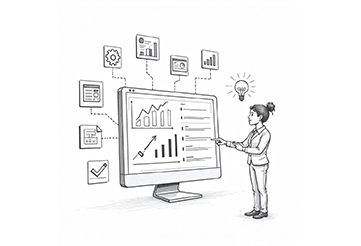How BI Tools Empower Human-Centered, Data-Driven Decisions?
Beyond dashboards and data points, Business Intelligence (BI) tools offer something deeper—a lens into clarity. They transform scattered information into focused insight, helping us move from reaction to intention, from confusion to confident action.
The Heart of BI: Turning Data into Clarity
Business Intelligence tools collect data from various sources—sales systems, CRMs, web
traffic, inventory logs—and unify them into visual reports, charts, and dashboards.
Platforms like Tableau, Power BI, Looker, and Qlik do more than display data; they uncover
truths hidden in spreadsheets and silos.
This is where the power begins. In 2020, a study by IDC revealed that data-driven
companies are 23x more likely to acquire customers, 6x more likely to retain them, and 19x
more profitable than their peers. But beyond numbers, it's about clarity. Imagine a CEO
who no longer makes gut-based guesses, or a supply chain manager who can spot
bottlenecks before they disrupt. That is the clarity BI brings.
From Insight to Impact: Real-World Case Studies
Starbucks, for example, integrates BI with AI to analyze customer buying behavior and
create location-specific promotions. It’s not just smart marketing—it’s thoughtful
engagement. Coca-Cola, on the other hand, uses social media analytics via BI to sense
public sentiment and shift its campaigns accordingly. Every click, every mention, becomes
a feedback loop.
Walmart, managing thousands of stores globally, uses BI to optimize its supply chain in
real time, reducing stockouts and waste. The result isn’t just better inventory—it’s fewer
missed opportunities, and more satisfied customers. Meanwhile, in healthcare, systems
like the Cleveland Clinic use BI to improve patient flow, reduce wait times, and allocate
staff intelligently—saving lives by reducing system friction.
These examples show that BI doesn’t just enhance business—it humanizes it. It listens,
learns, and responds with empathy and precision.
The Human Side of BI
Data without soul is just math. The real question is: What do we do with what we know?
BI tools awaken a deeper shift. They challenge ego-based decision-making. They replace
fear of the unknown with evidence-based action. They help leaders not just run
businesses, but understand them. With BI, decision-making moves from reactive to
reflective. We are no longer driven by assumption, but by understanding.
And that’s deeply human.
At its best, BI brings transparency. It helps leaders confront uncomfortable truths and
uncover hidden opportunities. It enables fairness—like ensuring hiring processes are
unbiased, or customer service is equitable. It allows space for ethical governance,
grounded in truth.

Challenges: Data Alone is Not Enough
Of course, tools are only as wise as the hands that hold them. Challenges exist: poor data
quality, resistance to change, lack of training, and even over-reliance on dashboards. As
seen in many failed BI rollouts, without a culture that values learning and collaboration,
data becomes decoration. Insight is only as powerful as the courage to act on it.
This is where leadership matters. BI must be a shared language—not just for analysts, but
for marketers, HR, operations, and strategy alike. Only then does it become
transformative.
Why It Matters: A Future Worth Building
In a world flooded with information, we don’t need more noise—we need wisdom. BI tools help us pause, examine, and decide. They reconnect businesses with their deepest questions:
- Are we truly serving our people?
- Are we building with integrity?
- Are we listening well enough?
These are not just business questions. They are human questions.
And BI, done right, helps answer them.
A Gentle Invitation from SNC
@SNC, we help organizations transform their data into decisions that matter—decisions
that build efficiency, trust, and growth with heart. If you believe the future of work should
be not just intelligent, but deeply human, let’s begin a conversation.
Because your data already holds the answers. We’re just here to help you listen.
